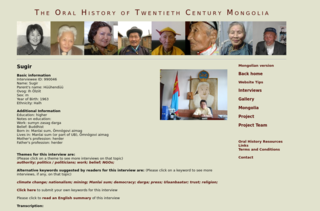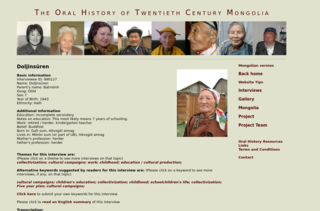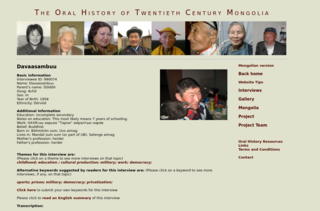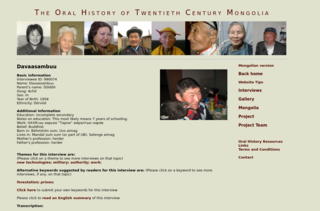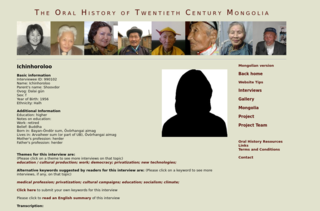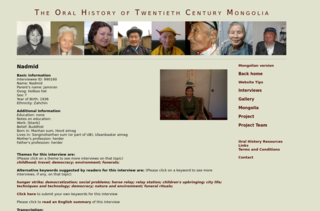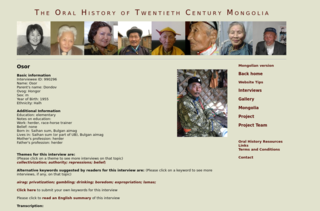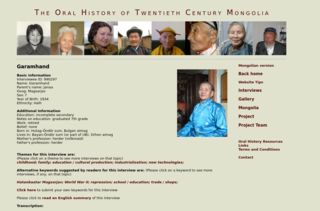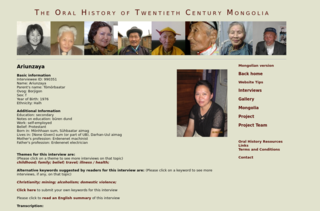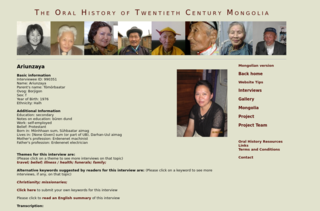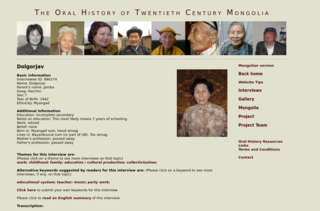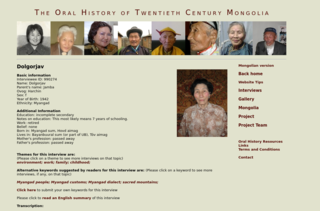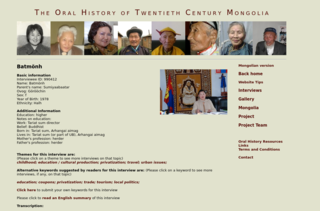The Oral History of Twentieth Century Mongolia collection
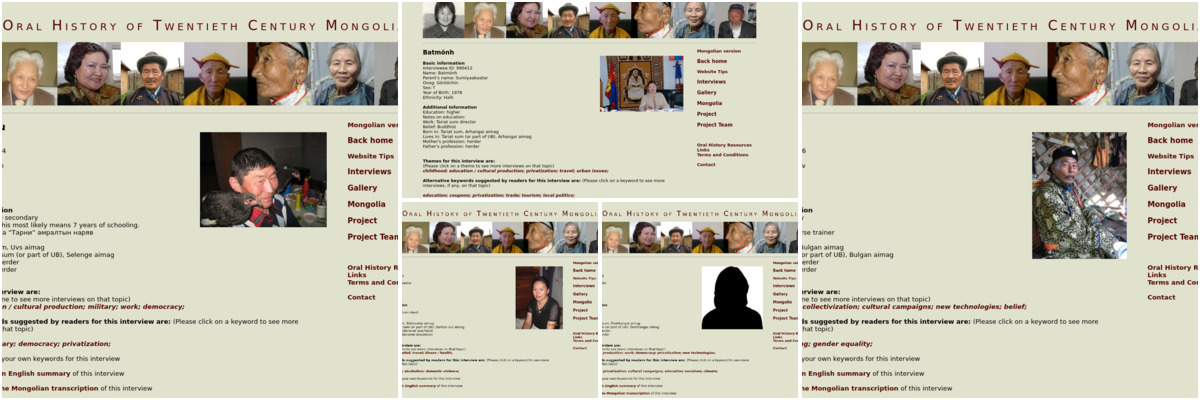
Metadata
identifier
9e3cbbfc-9e20-48e5-ad14-ea687b22316d
creator
MIASU
type
Collection
description
This collection includes a selection of translated interviews from the Oral History of Twentieth Century Mongolia project (http://amantuuh.socanth.cam.ac.uk/). The initiative was launched in July 2007 as a collaborative project between the Mongolia and Inner Asia Studies Unit (MIASU) of the University of Cambridge and the National University of Mongolia with funding from the UK Arts and Humanities Research Council (AHRC). The project collected over 600 interviews on a variety of themes and about a wide range of life experiences during Mongolia’s turbulent twentieth century. The interviews range from about one hour in length to over five hours long and were conducted all across Mongolia. The oldest person interviewed was born in 1911, the youngest in 1980. Some have PhDs, some have almost no education. All the interviews are available on-line, and searchable through a variety of means.
language
English
Mongolian
Items
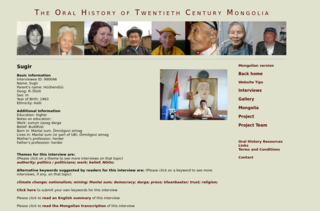
Oral history interview No. 080810B with Sugir (b. 1963): translation
Sugir
In this interview Sugirtai continues to elaborate on the topics of socialism and democracy.
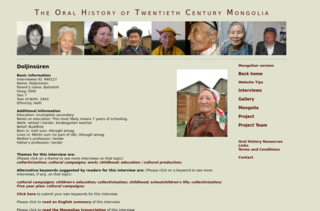
Oral history interview No. 080820A with Doljinsüren: (b. 1943): translation
Doljinsüren
Born in 1943 in Galt sum of Hövsgöl aimag.
subject: childhood, education, family, military, oral history, privatization, work

Oral history interview No. 081218A with Davaasambuu (b. 1958): translation
Davaasambuu
Oral history interview with Ööldöh Davaasambuu
subject: democracy, military, oral history, prison, privatization, sports

Oral history interview No. 081218B with Davaasambuu (b. 1958): translation
Davaasambuu
Oral history interview with Ööldöh Davaasambuu
subject: authority, military, new technologies, oral history, prison, work

Oral history interview No. 081223A with Ichinhoroloo (b. 1956): translation
Ichinhoroloo
Ichinhorloo was born in Bayan-Ӧndӧr sum of Ӧvӧrhangai aimag in 1956. Her father, Shoovdor, was a herder and had six children.
subject: biomedicine, democracy, education, new technologies, oral history, privatization, work

Oral history interview No. 090213A with Nadmid (b. 1936): translation
Nadmid
J. Nadmid was born in 1936. She tended livestock before she got married. She worked as a janitor and cleaner at sum and brigade centers. From 1990 she started tending livestock.
subject: Kazakh uprising, collectivization, cultural campaigns, family, oral history, privatization, repression, work
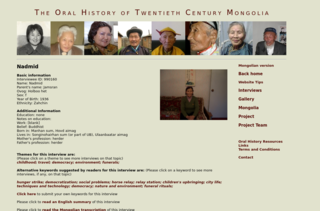
Oral history interview No. 090213B with Nadmid (b. 1936): translation
Nadmid
J. Nadmid was born in 1936. She tended livestock before she got married. She worked as a janitor and cleaner at sum and brigade centers. From 1990 she started tending livestock.
subject: childhood, democracy, environment, funerals, horse relay, oral history, travel, urban life
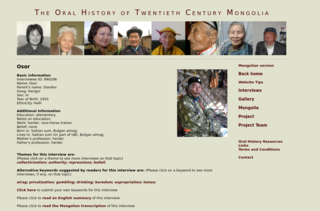
Oral history interview No. 090744A with Osor (b. 1955): translation
Osor
A former cooperative horse herder. Now he is a race horse trainer, herder.
subject: airag, authority, belief, collectivization, drinking, gambling, oral history, privatization, repressions
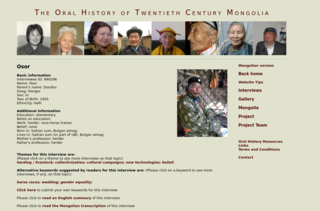
Oral history interview No. 090744B with Osor (b. 1955): translation
Osor
In the second part of his interview, Osor talked extensively about horses. He never imagined himself learning and becoming educated. He always thought of busying himself with horses.
subject: gender, horse races, oral history, wedding

Oral history interview No. 090745A with Garamhand (b. 1934): translation
Garamhand
J.Garamkhand was born in 1934 in Hutag-Öndör sum, Bulgan aimag, in a place called Bürged. She spent her childhood with her parents.
subject: Khatanbaatar Magsarjav, World War II, education, oral history, repression, trade

Oral history interview No. 090745B with Garamhand (b. 1934): translation
Garamhand
In the second part of her interview J. Garamhand told about the people who worked at the trade organizations. In the socialist period they occasionally had the problem of being in debt.
subject: Khatanbaatar Magsarjav, keepsakes, military, oral history, railway, trade, work
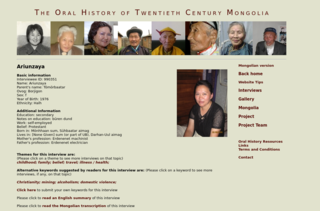
Oral history interview No. 090759A with Ariunzaya (b. 1976): translation
Ariunzaya
Ariunzaya was born in 1976 at Bürentsogt mine, Sühbaatar aimag. When she was three years old, her parents were appointed to work at the GOK that had just been established.
subject: belief, childhood, family, illness, oral history, travel
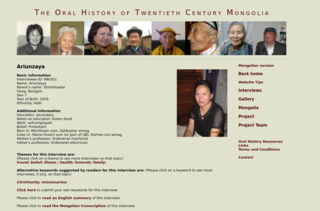
Oral history interview No. 090759B with Ariunzaya (b. 1976): translation
Ariunzaya
Ariunzaya egch told how she established a congregation [tsuglaan] in Dornod aimag. Her uncle lived in Dornod, which is why she went there by car in 1996.
subject: belief, family, funerals, illness, oral history, travel

Oral history interview No. 090804A with Dolgorjav (b. 1942): translation
Dolgorjav
Oral history interview with Jamba Dolgorjav.
subject: childhood, collectivization, education, family, oral history, work

Oral history interview No. 090804B with Dolgorjav (b. 1942): translation
Dolgorjav
Oral history interview with Jamba Dolgorjav.
subject: Myangad, childhood, environment, family, oral history, sacred mountains, work

Oral history interview No. 091028A with Batmönh (b. 1978): translation
Batmönh
Oral history interview with Sumiyaabaatar Batmönh.
subject: childhood, education, oral history, privatization, travel, urban issues

